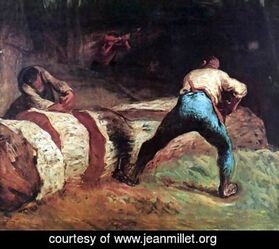 One of the traits that many people share is that of desiring perfection in one way or another. Those who are artists (of whatever kind) are always in search of honing their craft in the pursuit of perfecting it. Perfection is a ‘loaded’ concept, however. It is the proverbial double-edged sword since perfection is both a virtue we strive for and a burden we can carry: it is a virtue to want to be the best we can be, but it can be a burden because it can never be attained in this lifetime, (and if not reigned in it can lead to the prison of perfectionism). In the spiritual life we know that holiness is about striving for perfection, something evident in the lives of the saints. Holiness is the goal of every Christian who sincerely wants to respond to the call from God to be the best we can be in virtue and in love. However, we are prone to sin and so it would be truly unfortunate to think we should become perfect at some point. Therefore, we need to understand what it means to strive for holiness in this life so that we reach perfection in the next. And it is good to remember that while we pursue holiness individually, it is never really about ourselves; rather, it is directed toward the community. The most important reason to desire holiness, however, is because it is essentially for God: our growing holy is an act of love we offer to Him.  More than once I have heard a cringe-worthy ‘explanation’ of what Jesus said at the end of the Sermon on the Mount, “Be perfect as my heavenly Father is perfect.” (Matthew 5:48) When this is explained in a way that lays an unnecessary burden upon us, my heart sinks. Jesus most certainly did not intend this statement to be guilt-producing because He knows that it is impossible for us to be perfect. We can strive towards perfection, which is another way of expressing our desire to grow in holiness, but if we believe that we are the ones who must make ourselves perfect then we will have missed His point entirely. Let me be clear: the burden is shared by Jesus; it is not all on us! Therefore, to better understand what He said we need to consider two aspects, context and meaning.  The context is a discourse given by Jesus to teach His followers the way of life desired by God. (Matt. 5-7) He taught that we are to work at becoming the light of the world; to live by the spirit of the Law, not by the letter of the Law; to be faithful in relationships, to not retaliate, and to love our enemies. He went on to elaborate how to live this way by almsgiving, praying humbly (the Lord’s Prayer), depending completely on God, and not being judgmental. At first this can seem overwhelming, but rather than laying a heavy burden on us, Jesus was outlining a way of life which enables us to strive toward holiness, something we can think of as the path toward perfection. Jesus clarified His teaching when He later said: “Come to me, all you who labor and are burdened, and I will give you rest. Take my yoke upon you and learn from me, for I am meek and humble of heart; and you will find rest for yourselves. For my yoke is easy and my burden light.” (Matthew 11:28-30) Thus, Jesus indicated that to live the Christian life we bear the yoke (the burden) together with Him, and in so doing, it will become lighter and we will grow holier. We cannot to do this without Jesus.  The second aspect is meaning, which refers mainly to the intended message within the words spoken. When Jesus said to be perfect He was actually calling us to love perfectly, agapè, which is a Greek word that means to love as God loves, especially those who are the hardest to love.* It is only with agapè that we can love an enemy, since such a one would be most difficult to love. This love is not about feelings, but rather it is about acting with mercy and forgiveness, offering kindness to our enemy, just as God does. God’s love for sinners, (all of us), never fails: that is agapè. To love this way is quite difficult, but if we willingly take on the yoke with Jesus, His grace can enable our love to grow in ways beyond our natural ability. This way of love is what identifies us as Christians. Thus, we can reflect upon the entire passage in its context and meaning: Jesus said, “If you love those who love you, what recompense will you have? Do not the tax collectors do the same? And if you greet your brothers only, what is unusual about that? Do not the pagans do the same? So be perfect, as your Heavenly Father is perfect.” (Matthew 5:46-48) That is, love with agapè as your heavenly Father loves.  In these last weeks of Lent, the deepest part of our journey, we can be mindful of how important it is to trust in the love of God enough to strive for the perfection to which He calls us, which is not that we be perfect, but that we are open to His will and the action of His love within us. This means we must let Him love us perfectly so that we are transformed into the way of His love and in turn, share it with our brothers and sisters. May we allow God’s perfect love to transform our hearts! May we desire to be yoked to Jesus so that we can bear life’s trials and joys together, loving as He does! And may this time late in Lent inspire us to strive for holiness so that we might glorify God! Let us meet in the Heart of Jesus! Peace! ©Michele L. Catanese *Remember that in Greek there are multiple words for love. Some of the words used in Scripture are: philia, which indicates the love of friends, eros, which indicates the love between spouses, and agapè, God’s perfect love. Images: 1. My photo of a rose, taken in some gardens in Ireland. 2. Painting, Sermon on the Mount by James Tissot. (1886-96) 3. Painting, The Wood Sawyers by Jean-Francois Millet. (1848) 4. Icon, La Sangre de Cristo, by Fr. William Hart McNichols. If you are interested in a copy, you can find this at fineartamerica.com/featured/la-sangre-de-cristo-242-william-hart-mcnichols.html 5. My photo, waves on the Big Island of Hawaii. Note: In compliance with GDPR rules, I wish to make it clear that I do not gather any information on any of my readers at any time. Comments are closed.
|
Heart Speaks to Heart
|

 RSS Feed
RSS Feed

